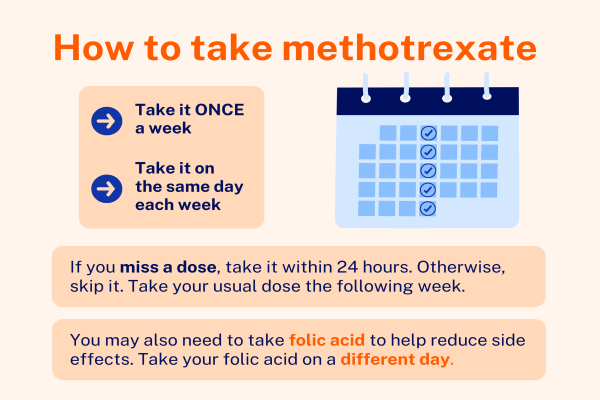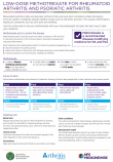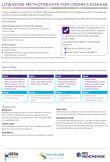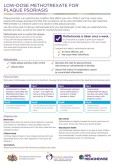You can now add Healthify as a preferred source on Google. Click here to see us when you search Google.
Methotrexate tablets for inflammatory conditions
Sounds like 'meth-o-trex-ate'
Key points about methotrexate
- Methotrexate is used to treat inflammatory conditions such as rheumatoid arthritis, psoriasis and Crohn's disease.
- When methotrexate is used for these conditions, it's only taken ONCE A WEEK.
- Methotrexate is also called Trexate®.
- Find out how to take it safely and possible side effects.

Methotrexate is used to treat inflammatory conditions such as rheumatoid arthritis, psoriasis and Crohn's disease. These conditions are also called autoimmune conditions because they are related to an ‘overactive’ immune system. Autoimmune means that your body ‘attacks’ itself, without any real known cause or reason.
Methotrexate is an immunosuppressive medicine, which means it weakens your body’s defence (immune) response, slowing the disease and reducing inflammation.
When methotrexate is used for these conditions, it's only taken once a week.
 Image credit: Healthify He Puna Waiora
Image credit: Healthify He Puna Waiora
Extra care is needed when taking methotrexate
Most people who take methotrexate once a week have no problems but extra care is needed when taking it. Methotrexate is considered a high-risk medicine because it can cause serious side effects. There isn’t a big difference between a safe dose of methotrexate and a harmful dose. This means you must always make sure you take the right dose.
In Aotearoa New Zealand methotrexate is available as tablets in 2 strengths – 2.5 mg and 10 mg.
- Always take your methotrexate exactly as your doctor has told you. The pharmacy label on your medicine will tell you how much to take, how often to take it and any special instructions. If it looks different to what you were expecting, ask your pharmacist to check.
- The dose of methotrexate is different for different people, depending on what it's being used for, your weight and how well it's working.
- Take methotrexate tablets once a week on the same day each week.
Folic acid
Note: You may be asked to take folic acid tablets while you're taking methotrexate.
- Folic acid is a type of B vitamin that you need for your cells to divide and grow normally. Folic acid is also needed for your body to make red blood cells.
- Methotrexate blocks some of the actions of folic acid, which can lead to side effects such as mouth sores, stomach pain, liver problems, hair loss and anaemia.
- Taking folic acid supplements can help offset methotrexate side effects.
- Take your folic acid on a different day from your methotrexate.
- Timing of your doses: Take methotrexate tablets once a week on the same day each week. Methotrexate is best taken on an empty stomach, but if it makes you feel nauseous or sick, try taking it with food.
- Swallow your tablets with a drink of water: Don't crush or chew them.
- Limit or avoid alcohol: Limit alcohol to 1 to 2 standard drinks once or twice a week. Avoid heavy or binge drinking because it can increase your risk of side effects, such as problems with your liver. Learn more about what a standard drink is.
- Missed dose: If you forget to take your dose on the right day, you can take the missed dose up to a day later. Otherwise, skip the dose and continue the next week. Don't take 2 doses at the same time.
- Folic acid: You may be asked to take folic acid tablets while you're on methotrexate. This is to help reduce side effects. Take your folic acid on a different day from your methotrexate.
- Keep taking methotrexate regularly. Methotrexate doesn't work straight away. It usually takes a few weeks or months before you notice the full benefits. If you stop methotrexate treatment for more than a few weeks your condition may get worse.
Here are some things to know when you're taking methotrexate. Other things may be important as well, so ask your healthcare provider what you should know about.
Make sure you take the right dose
Methotrexate tablets come in 2 strengths: 2.5 mg and 10 mg. When you collect your methotrexate prescription:
- Check that your tablets are the right strength: If your tablets look different to what you are expecting, ask your pharmacist to check.
- Check that you're taking the right number of tablets for your dose: The label on your medicine should tell you the correct number of tablets to take.
There isn’t a big difference between a safe dose of methotrexate and a harmful dose, so it’s important to double check your dose and ask if it's not what you were expecting. Also be aware of the signs you may be taking too much methotrexate.
Signs you may be taking too much methotrexate |
Seek medical advice straight away if you get the following symptoms:
|
Tests and monitoring
Methotrexate weakens your immune system, making it harder for your body to fight infections. Before you start methotrexate, you may need tests to make sure you don't have any infections such as tuberculosis (TB)(external link), HIV(external link), hepatitis B and hepatitis C(external link).
While you're taking methotrexate, you'll need regular blood tests to monitor for side effects and to check whether the treatment is working. Blood tests are very important during the first few months of treatment. Over time, these tests are needed less often.
Vaccinations
Methotrexate makes your immune system weaker, putting you at increased risk of infections. Vaccines are a good way to prevent some infections. You should have all the vaccinations you need before you start treatment with methotrexate. Some vaccines shouldn't be taken while you're taking methotrexate. Always check with your doctor or pharmacist first. It's safe for you to have the annual flu vaccine. Keep your flu vaccinations up to date to reduce your risk of getting the flu.
Taking other medicines
Methotrexate may interact with a few medicines and herbal supplements, so check with your doctor or pharmacist before starting methotrexate or before starting any new medicines, including those you may buy over the counter.
Sun protection
Methotrexate makes your skin more sensitive to the sun. Protect your skin when you are in the sun, especially from 10am to 3pm. If you're outdoors, wear protective clothing and use a high factor sunscreen (SPF 30+ or higher).
Pregnant or planning a pregnancy
People of all genders who are taking methotrexate and are sexually active need to use effective contraception to prevent pregnancy. If you or your partner would like to become pregnant, contact your doctor a few months ahead of time so you can make a plan about stopping methotrexate.
- Males: You must use effective contraception for at least 3 months after stopping methotrexate.
- Females: You must use effective contraception for at least 6 months after stopping methotrexate.
Like all medicines, methotrexate can cause side effects, although not everyone gets them. Often side effects improve as your body gets used to the new medicine.
| Side effects | What should I do? |
|---|---|
|
|
|
|
|
|
|
|
|
|
Read more about medicines and side effects(external link) and reporting a reaction you think might be a side effect(external link).
The following links have more information on methotrexate. Be aware that websites from other countries may contain information that differs from New Zealand recommendations:
Methotrexate(external link) RheumInfo
Methotrexate(external link) Medsafe Consumer Information Sheet, NZ
Methotrexate(external link) Australian Rheumatology Association
Methotrexate(external link) Arthritis Research, UK
Brochures
Low-dose methotrexate for rheumatoid arthritis and psoriatic arthritis(external link) NPS MedicineWise, Australia
Low-dose methotrexate for plaque psoriasis action plan(external link) NPS MedicineWise, Australia
Low-dose methotrexate for Crohn's disease(external link) NPS MedicineWise, Australia
5 questions to ask about your medications(external link) Health Quality and Safety Commission, NZ English(external link), te reo Māori(external link)
References
- Methotrexate(external link) New Zealand Formulary
- Spotlight on weekly methotrexate(external link) Medsafe Prescriber Update, NZ, March 2025
Brochures

Low-dose methotrexate for rheumatoid arthritis and psoriatic arthritis
NPS MedicineWise, Australia, 2020

Low-dose methotrexate for Crohn's disease
NPS MedicineWise, Australia, 2021

Low-dose methotrexate for plaque psoriasis
NPS MedicineWise, Australia
Credits: Sandra Ponen, Pharmacist, Healthify He Puna Waiora. Healthify is brought to you by Health Navigator Charitable Trust.
Reviewed by: Angela Lambie, Pharmacist, Auckland
Last reviewed:





